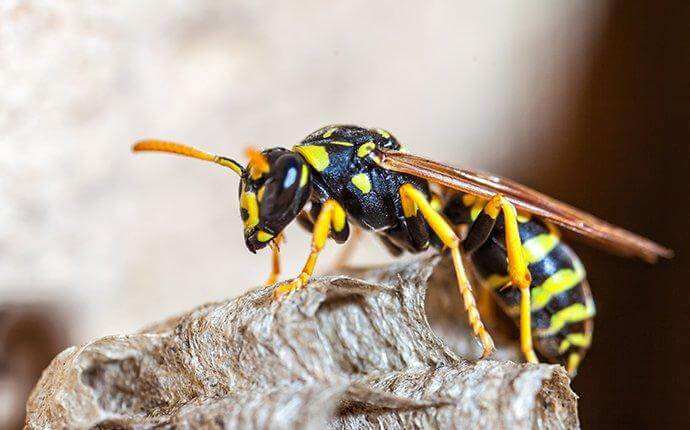Not knowing all of the traits of various pest varieties can leave people with the wrong idea of how dangerous an infestation can be. Stinging insects, commonly called wasps, are this kind of pest. While they are good for the environment, they can put a damper on outdoor activities, and leave properties unsafe when they nest out in the yard. Knowing how many different kinds of wasps there are, and what you can do to keep them out, will help your home or business stay protected.
Trick Question Alert
The title of this blog is a bit of a trick question, but it’s one that pest pros hear often. People don’t know that hornets are actually a type of wasp. The term applies to any flying, stinging insects, and the family of bugs includes bees, yellow jackets and hornets, all of which come in many different shapes and sizes. Some are more dangerous than others, however. Honeybees and bumblebees, which are excellent pollinators that die off if they dole out stings, are typically gentle pests that keep to themselves. However, yellow jackets and hornets aren’t as wary of people, and they can be extremely territorial. Knowing all the pros and cons of wasps on your property helps determine what the proper course of action is.
Pros & Cons Of Stinging Wasps
You probably don’t need an expert to tell you that wasp stings suck. They hurt and can carry harmful venom that affects some people worse than others. But did you know that wasps are an important part of any ecosystem? Here are the pros and cons of wasp populations.
Pros
- Pollination: While yellow jackets and hornets aren’t great pollinators, bees are some of the best in the animal kingdom, which furry bodies that help carry plant pollen far and wide. Not only does this help spread beautiful flowers around the world, but it aids the growth of agriculture, too.
- Predators: Even the wasps that don’t spread pollen around are valuable, because they hunt and kill many pests that are bad for plants. Caterpillars, aphids and beetles that eat clean through crops are all commonly hunted by wasps, as well as other predatory bugs, like spiders, that you don’t want around either.
- Wasp eat wasp world: It may seem counterintuitive, but wasps can also beneficial in controlling the population of other wasps. Hornets, the largest variety of wasp, hunt and kill bees and yellow jackets.
Cons
- Stings: If you’ve never been stung by a wasp of any kind before, count yourself lucky. The unpleasant burning or stinging sensation can linger for a long time and, even for folks who aren’t allergic, accumulating wasp stings can quickly become hazardous to your health.
- Allergies: Some people are deathly allergic to the venom carried in wasp stingers. If an allergic person is stung, or even suspected of being stung, by a wasp, seek medical attention immediately.
- Territorial: Whether you’re allergic or not, you don’t want a hive of territorial, flying bugs marking your property as their territory. Once wasp nests form, they can be tough to get rid of safely and correctly.
Wasp Prevention For Your Property
Beneficial or no, humans and wasps don’t mix. The world’s much better off the more we try to keep our populations separate. Here’s what you can do around your property to make it less attractive to wasps looking for a yard to start a new hive:
- Landscaping: Wasps look for shady areas of overgrowth to build nests in, so reducing the length of overhanging tree limbs and hedges will reduce their real estate options. Well-trimmed grasses provide fewer anchor points for flying bugs to rest on, too.
- Moisture control: Insects and pests of all kinds are attracted to areas with ample moisture, what with water being an essential part of life and all. Make sure to eliminate standing puddles of water, and keep up on proper yard drainage and property plumbing.
- Treatments: Professional treatments, applied by trained experts, can give you peace of mind that a wasp population won’t get near your property.
For Safe Removal, Contact Romney
If a wasp population has already moved onto your property, don’t try to handle it on your own. Not only can improper removal risk danger to you and your loved ones, but a swarm of angry wasps can risk exposure to people for miles around, some of which might be deathly allergic to stings. Instead, contact the pros at Romney Pest Control, who can inspect your home for signs of wasps or eliminate existing problems in a safe and timely manner.
Help us all control wasp populations and keep the world healthy, turn to Romney for total wasp control.




